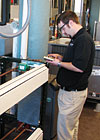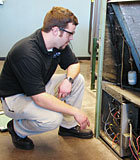
Second-year HVACR student Brad Bartz checks out the thermostat on the heating system he helped put together.
[Editor’s Note: The NEWS has been following the educational path of HVACR student Brad Bartz since he stepped into Ranken Technical College in St. Louis for the 2006 fall semester. This is another installment in a series of periodic reports on Bartz’s career path progress.]
ST. LOUIS - Ah, one more semester to go and Brad Bartz will be free to select an HVACR career of his choice.
Just don’t ask him what path he plans to take.
As late as Dec. 3, 2007, when The NEWS last visited the campus of Ranken Technical College, in St. Louis, Bartz was uncertain as to what he would call his “ideal job.”
“I haven’t even thought about it,” answered the 25-year-old HVACR student, when asked last month. “I don’t know. I haven’t had time to think about it.”
Blame that, in part, on a busy work schedule. In addition to attending HVACR school full-time, Bartz works behind a deli counter at a local grocery store from 20 to 32 hours a week. After all, one needs an income to help pay for one’s education.
“I can’t wait to get out of here,” said Bartz, before quickly adding, just to make sure his sentiment was not misconstrued, “I mean, it’s a good school and everything, but I just want to get into the workforce and into a job I like.”
Just don’t ask him what path he plans to take.
As late as Dec. 3, 2007, when The NEWS last visited the campus of Ranken Technical College, in St. Louis, Bartz was uncertain as to what he would call his “ideal job.”
“I haven’t even thought about it,” answered the 25-year-old HVACR student, when asked last month. “I don’t know. I haven’t had time to think about it.”
Blame that, in part, on a busy work schedule. In addition to attending HVACR school full-time, Bartz works behind a deli counter at a local grocery store from 20 to 32 hours a week. After all, one needs an income to help pay for one’s education.
“I can’t wait to get out of here,” said Bartz, before quickly adding, just to make sure his sentiment was not misconstrued, “I mean, it’s a good school and everything, but I just want to get into the workforce and into a job I like.”
Now in his last full semester, Bartz is debating on what HVACR road he should travel. Last semester (fall 2007) was dedicated to the basics of commercial refrigeration, heating, and cooling. This spring 2008 semester, which kicked off recently, he is scheduled to take a serious look at residential HVACR.
“I definitely like commercial refrigeration,” he said, looking back on what he was taught from September through December of last year. “I mean, I get that. And, there may be more opportunity there. I understand the money is in commercial. Residential I didn’t think pays as much.”
The Maryland, Ill., resident was not about to jump the gun, however. He knows all about the lack of technicians in the industry - period. He is going to reserve revealing his final career plans until close to May - definitely after this final semester, which is fully dedicated to the basics of residential HVACR.
“I really haven’t done much research,” he confessed. “But, I know wherever I decide to go, it will all be good.”
That’s his hope, anyway.

Bartz contemplates the complicated wiring inside a commercial air-handling unit in Ranken’s HVACR lab.
LEARNING THE COMMERCIAL ROPES
Since stepping into Ranken nearly two years ago, the final goal was always to find employment in this industry. Learning the ins and outs of the trade from knowledgeable and helpful instructors has only solidified Bartz’s focus. “It’s probably a little harder,” said Bartz, referring to the commercial side of the trade. “There are more components, but it is kind of neat to work on complicated equipment.”Upon opening up the lower panel of a commercial air handler in the HVACR lab at the St. Louis school, Bartz commented, “Look at that spaghetti wiring.”
The student had to scratch his head looking at the complicated array of wires, which seemed to be running every which way.

Bartz examines the thermostat he plans to incorporate into a working heating system, a project he helped build with help from fellow students.
“The thing kind of was a pain in the ass to put together, for lack of a better term,” said Bartz, who could admire the finished project inside Ranken’s lab. “It needed to be wired and everything. The boiler was the only thing there and nothing else.”
It was definitely a learning experience, as was getting a real, live commercial air handler up and running. “We got it running, but nothing was cycling,” he said of the latter experiment. “We had to go by the [wiring] diagrams, but some of the stuff wasn’t even [in] there. It was a matter of redoing the wiring altogether. I had everything labeled.”
The second-year student was proud of the fact he was able to troubleshoot the large equipment. “It definitely needed a thermostat,” he said.
Bartz has truly become alert and in tune with commercial cooling and refrigeration equipment. For instance, he could not help but diagnose a leak in one of the reach-in coolers in the deli area at the grocery store where he works after classes end each day at Ranken. “That was kind of neat to find,” he said.

Careful in taking the front panel off, Bartz goes exploring on a piece of Carrier equipment, donated to Ranken Technical College.
ON HIS WAY IN MAY
In addition to the residential HVACR class and lab, Bartz has conceptual physics and an introductory business management course in his final school semester.On this particular day, at the conclusion of his commercial HVACR class, Bartz was preparing for an oral presentation on Nostradamus, considered one of the world’s most famous authors of prophecies. Why Nostradamus? Well, a few days prior to getting the assignment in English class, he had watched a special report on the Frenchman on the History Channel and thought the author, known for his book Les Propheties, would make for an interesting oral presentation.
“I am against many of his predictions,” said Bartz. “How many did not even come true?”
Here’s one prediction: Bartz will graduate in May and have a whole lot of career choices. Which path he takes will be determined later this year.
Publication Date:01/21/2007

Report Abusive Comment